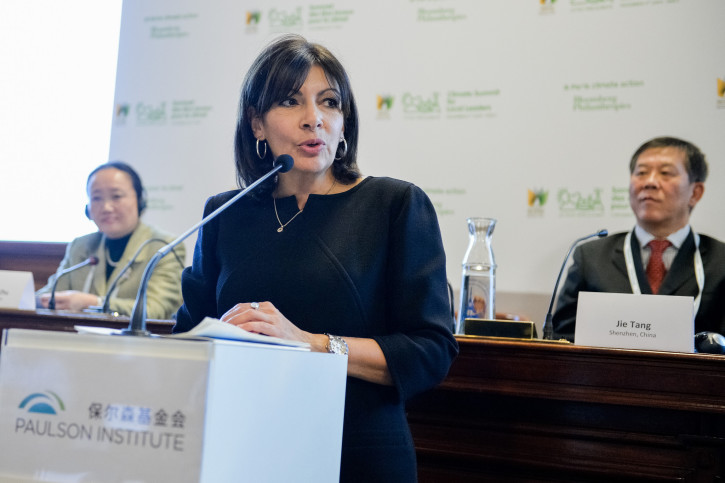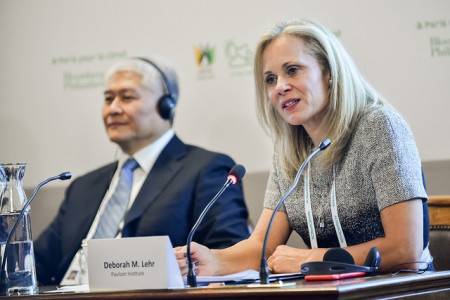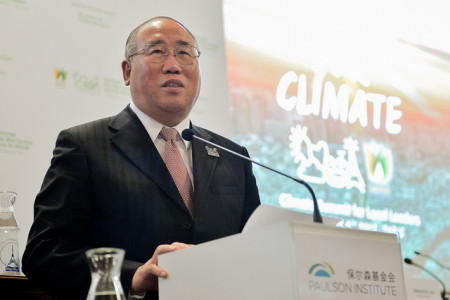By Deborah Lehr

The horrific images of thick, toxic air pollution blanketing Beijing, under ‘Red Alert’ this week for extreme pollution, are alarming to say the least. But there is a major reason to believe that China is committed to tackling its air pollution crisis—and to achieving its ambitious carbon emissions reduction goals: A major economic transition to a more services-focused, low carbon economic model is underway.
China’s cities will have to lead the way to a cleaner mode of economic growth. According to a new report commissioned by Bloomberg Philanthropies, China’s urban energy-related carbon emissions are responsible for 58% of the country’s total energy-related CO2 emissions. The good news is that China’s mayors are being deployed to implement the new, more sustainable economic policies and bring carbon emissions down.

Chinese mayors’ drive to hit new carbon emissions targets was evident at a forum on sustainable cities in China hosted by the Paulson Institute during the COP 21 climate conclave in Paris. Eight mayors from cities across China flew to Paris to share their plans for action and pledge their commitments to creating low-carbon growth. The Chinese mayors’ session was part of a day-long Climate Summit for Local Leaders, which convened 400 mayors and 1000 delegates from around the world to develop municipal solutions for reducing carbon emissions. The Summit was hosted by the city of Paris and Bloomberg Philanthropies.
During the Chinese session, Paris Mayor Anne Hidalgo, Los Angeles Mayor Eric Garcetti, Xie Zhenhua, China’s top climate negotiator, and local leaders from Beijing, Shenzhen, Wuhan, Zhenjiang, Guiyang, Lanzhou, Ningbo and Nanjing all underscored the important role that cities must play in fighting climate change.
Why are China’s cities so important in this process? Over the next five years, more than 100 million people will move to China’s urban areas, with enormous environmental implications. The central government is taking potentially game-changing steps to encourage more environmentally sustainable building and growth in the cities. Promotions for local officials, for example, are now contingent on meeting environmental targets in addition to economic goals.
To help support that effort, the Paulson Institute conducts an annual training program for Chinese mayors, who study cutting-edge urban planning and visit U.S. cities to gain on-the-ground insights. The program helps China’s leaders, who have risen up during a time when all emphasis was on economic development, with little talk about the environment, learn what defines smart infrastructural planning and truly sustainable projects.
In addition, the Institute’s CEO Council for Sustainable Urbanization brings US and Chinese business leaders together to collaborate on model projects that will help promote sustainable urbanization—from green buildings to efficient energy use.

Recent research suggests that the greatest opportunities in fighting climate change may lie in constructing better buildings—especially in China’s cities. Some 40% of the world’s carbon emissions come from buildings, and about half of the buildings being constructed will go up in China in the near future. To help inform better building policies, the Paulson Institute has published research on improving building codes and a case study on how projects in the United States, the UK and India approached sustainable housing.
China’s challenge—and one certainly weighing on its mayors—will be to stick to its low-carbon plans in the face of a slowing economy. The mayors no doubt will be tasked with maintaining growth—and political stability—even as they fight pollution and carbon emissions. There need not be a trade-off. A recent Paulson Institute report points out that increased energy efficiencies and smart planning can help China achieve both goals at the same time.
By definition, mayors are do-ers, and they have tremendous ability to influence economic development. China’s mayors are no exception. If they are equipped with knowledge and clear sustainability goals as they set the direction for local economic plans and projects, they can help guarantee that China will meet its low-carbon targets—and ensure a healthy planet for generations to come.




